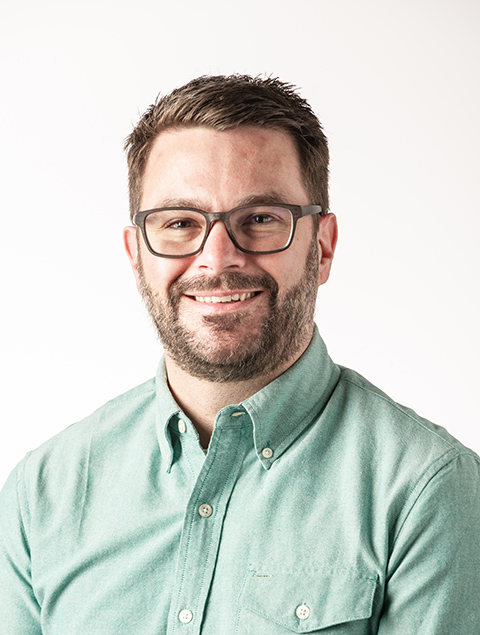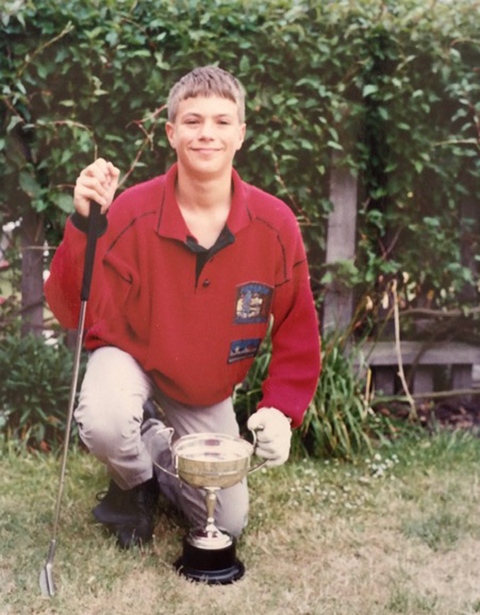For Distinguished Researcher Andrew Ferguson, Ideas and Golf Are Par for the Course
National Renewable Energy Laboratory (NREL) Distinguished Researcher Andrew Ferguson had a chemistry kit as a boy but never imagined that it would lead to a science career.
Instead, growing up in the small town of Newbiggin-by-the-Sea in North East England—a fishing and mining area not known for academic pursuits—he preferred playing golf. His father encouraged him to start seriously when Ferguson was about five years old.

Andrew Ferguson. Photo by Dennis Schroeder, NREL
As for a career, eventually he envisioned that he might become a draftsman working on technical drawings.
Fortunately, a high school teacher—who happened to also be his school’s golf coach—convinced Ferguson to take advanced chemistry. “He made it so much fun that I realized I would like to study chemistry,” Ferguson said.
It was an example of the way his life’s path has unfolded. “I’ve never been a person using a long-term plan. I honestly stumbled into a lot of things,” he said. “Thankfully, things worked out the way they did.”
And while many of his schoolmates quit school after high school, he was different. Encouraged by his parents who were teachers, Ferguson began looking at colleges. One stop was Imperial College in London, the big city where he had never visited. “Honestly, I didn’t think I was smart enough to get into Imperial, which had a good reputation. It wouldn’t have been on my radar because of my hometown, but it was because my uncle went there,” he said. “I did visit Oxford with an A-level group from my school—but did not like that environment.”
Imperial, in a great area packed with museums and next to the iconic Royal Albert Hall, was a dream.
While there, one of his advisors was Garry Rumbles, now an NREL Senior Research Fellow. While working on his master’s degree, Ferguson developed one of his lifelong research passions. “I’ve been fascinated since my master’s project with using light to interrogate materials or initiate changes in materials,” he said. Those photosensitive materials can be used to generate electricity or some other form of energy, as well as to store that energy.
However, Rumbles left to join NREL and Ferguson joked, “I always say he abandoned me in the middle of the project. But he and I stayed in touch.” As Ferguson was graduating from Imperial with his Ph.D.—and was thrilled to walk across the Royal Albert Hall stage—Rumbles encouraged him to apply for an open postdoc position. Ferguson landed the position and arrived in 2006.
Helping Postdocs and Grad Students
Ferguson, now a group manager for spectroscopy and photoscience, began making his mark in his field. He has been called a trailblazer in critical materials and low-energy microelectronics.
Last year, for example, he spearheaded NREL’s contribution to the successful Reconfigurable Electronic Materials Inspired by Nonlinear Neuron Dynamics (REMIND), funded in the Basic Energy Science Energy Frontier Research Centers (EFRC) cohort of 2022. Ferguson serves as one of the associate directors of REMIND, which is using, as its website says, reconfigurable computing architectures that approach fundamental limits of energy efficiency and speed.
Equally important is his role in mentorship. Ferguson was a co-founder of NREL’s largest employee resource group (ERG), the Postdoc and Graduate Student Network (PDaGS). He recalled his own journey as a postdoc.
“My personal strategy was probably not the best. It would have been good to have some additional professional development and a smoother path when I was a postdoc,” he said.
He and others in the Materials Chemical and Computational Sciences department recognized that there were large numbers of postdocs and grad students in the directorate, perhaps 160 or so, who were hungry for more professional development.
“As much as our Workforce Development team wanted to help, they didn’t have the personnel to support that large number of people in the way they’d really want to,” he said. There were even more in the other S&T [science and technology] directorates who also wanted more tailored mentoring in their early stages of scientific careers. “So, we wanted to put together a group that would work with S&T directorates, human resources, and leadership to give these young scientists more help along their career path,” he said.
So, in February 2020—just before the pandemic disrupted operations at NREL and elsewhere—the PDaGS held its first in-person meeting. The kickoff went well—but soon, the ERG had to adapt to a new reality as the laboratory adjusted to COVID operations. “The social elements were difficult remotely,” Ferguson said, but everyone persevered. Today, more than 400 members, predominantly postdocs and graduate students but also NREL staff, take part in this ERG.
With the ERG’s signature events such as gradate student and postdoc appreciation weeks, Ferguson—now serving as a consultant—said that because of this ERG, there’s “a little more recognition to those getting most of the research done here and their critical contributions.” Ferguson also has tried to emphasize the importance of safety, a key area in laboratory operations and a key part of his approach to work.

Andrew Ferguson found success on the golf course, but it was his high school golf coach and teacher who saw bigger things for him as a physics student. Photo from Andrew Ferguson, NREL
And although he is busy with his research as well as raising his daughters, 12 and 14, with his wife Courtney, he has found time to pursue this childhood passion. The boy who grew up about a minute away from the Newbiggin golf clubhouse still tries to hit the links two or three times a month. The Distinguished Researcher said he is still “decent” at golf, carrying a 6 handicap.
Those who have played in monthly NREL tournaments for the past 15 or so years will attest to the fact that Ferguson may be a bit modest. He is the all-time money winner in the tournaments, having pocketed some $1,900 in gift cards for his winning scores. He enjoys the technical aspects of the sport—but admitted that having started early is the key.
“I took up skiing here to be with my daughters, and I find myself constantly thinking about everything I do while skiing,” he said. “When I play golf, I never think about mechanics.”
Ferguson said that he credits his success at NREL to getting to work with a number of excellent mentors who knew how to get the best out of him and when to offer tips to improve his swing. He points to the similarity between a good golf coach and a good mentor, and said, “Every golfer has a unique swing, and a good coach knows how to work with that foundation to get the best out of their players game,” something he tries to put into practice when mentoring junior researchers.
While his career path may not be as direct as he wanted, he seems to be moving with the same certainty he possesses on a golf course. And the self-described decent golfer has emerged as a pretty decent scientist indeed.
Ferguson was one of seven NREL staff to receive the Distinguished Member of Research Staff (DMRS) designation in 2023. He was recognized for “being one of the very top spectroscopists at NREL and in the world.”
The DMRS designation is intended to provide greater recognition to NREL researchers. It should also position individuals to work in more strategic and technical leadership roles, with continued expectations for their contributions to further enhance NREL's reputation and mission objectives.

